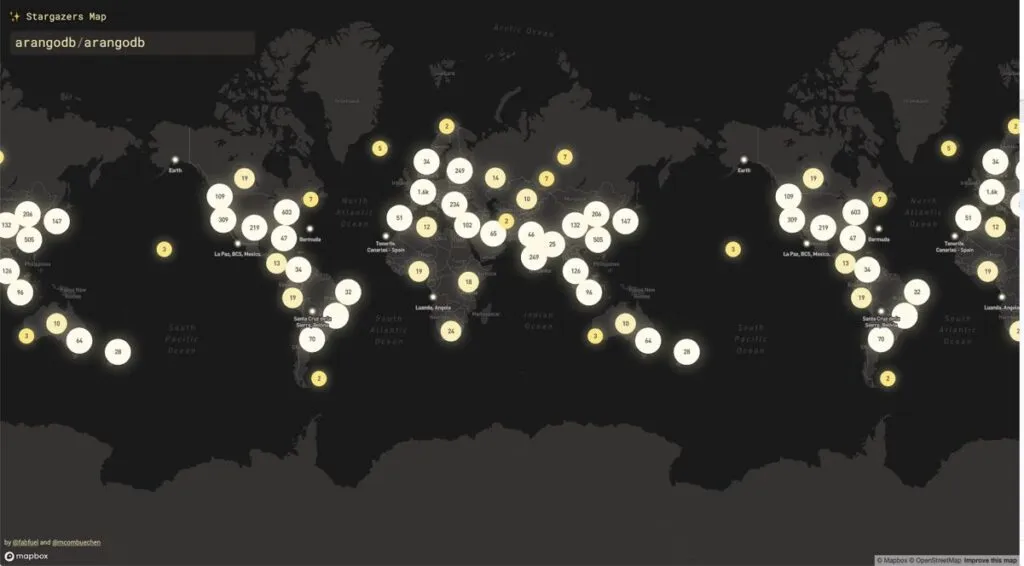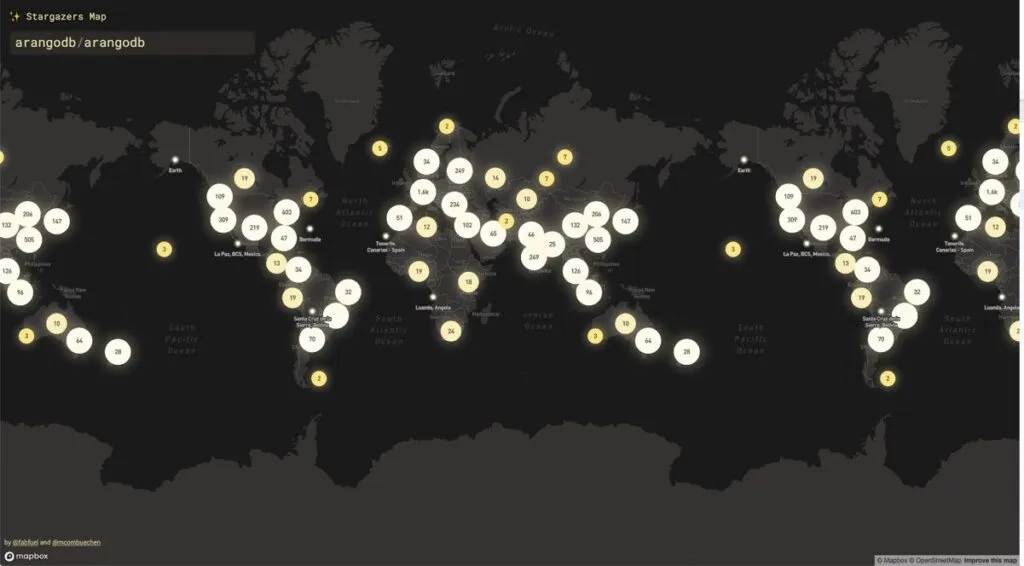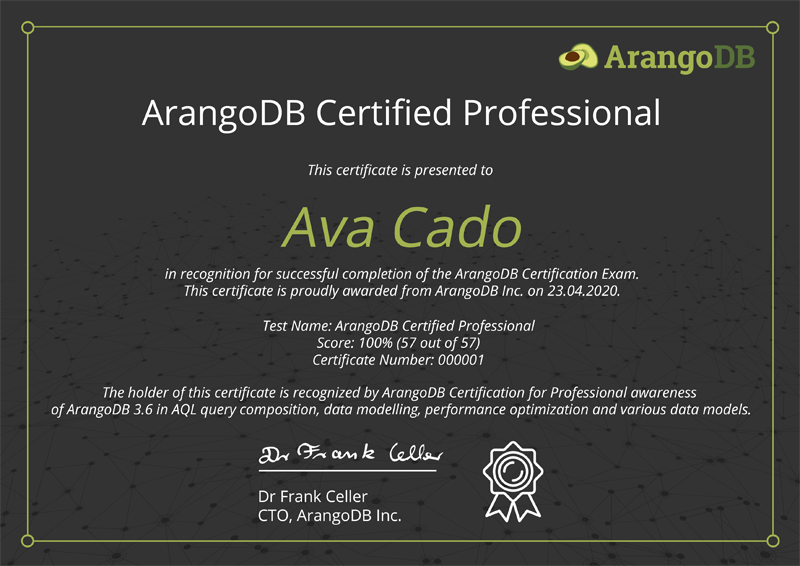ArangoDB Assembles 10,000 GitHub Stargazers
Estimated reading time: 3 minutes

Today is a marvelous day for the ArangoDB project and the community behind it.
A couple of minutes ago, the 10,000th stargazer joined the project on GitHub, and we want to send a really big “Thank You!” to each and everyone of you for showing your support.
Thank you for all your pull requests, issue reports, emails, meetings, projects, votings and reviews, which forge our thinking and fuel our motivation.
A few years ago, we were only a small team of engineers who started to raise the question “Can data models become features?”.
Back then developers had to either stay with one database and construct workarounds to make up for missing capabilities, or introduce a second, maybe even third, persistence technology into their applications – and all the complexity that comes along with it. With native multi-model in ArangoDB, developers can easily go “Graph & Beyond” and basically just have to change a query to use the right data model for the right job.
The feedback to the idea of a multi-model database has not always been “Hurray!!!”. Many criticized the idea behind ArangoDB for working on some kind of ‘silver bullet’ which we all know does not exist. But, ultimately, it is about software. Developers always find ways to overcome a problem and code complexity away. And this is what we did to databases.
Guided by our users, customers and founders we got rid of the need to manage multiple databases and even allow to combine data models in a single query. With ArangoGraph, users do not even have to worry about running ArangoDB as a dedicated team is doing it for them.
Fast forward to 2020, and the small team grew to over 60 people and a community of thousands of Arangos around the globe. Multi-model is a thing now and, according to DB-Engines, ArangoDB is among the most popular Graph and Document databases, as well as Search Engines.
Without many early believers, especially on the customer side, we would have never crossed this milestone today. A very grateful “Thank you!!!” goes out to all our customers who put their trust in a very early product in 2016 and 2017, and our investors, Bow Capital & Target Partners, who saw the huge potential of data models becoming features and their exceptional support.
The whole team is so grateful for all your energy lighting up so many bulbs :)
To graph and beyond!

Continue Reading
ArangoDB Included in DBTA 100: The Companies That Matter Most in Data
A Deep And Fuzzy Dive Into Search
Estimated reading time: 16 minutes
Together with my team, I took a deep dive into the available fuzzy search approaches and algorithms for quite a while, in order to find a performant solution for the various projects ArangoSearch gets used for.
Since the introduction of ArangoSearch back in 2018, many of our users have asked for fuzzy search support. We worked hard on getting this done, and the whole team is now excited to finally make fuzzy search available with the upcoming ArangoDB 3.7.
In the following, we will share our learnings and hope they are useful for you.
(more…)Do Graph Databases Scale? Yes? No? Let’s see!
Estimated reading time: 10 minutes
Graph Databases are a great solution for many modern use cases: Fraud Detection, Knowledge Graphs, Asset Management, Recommendation Engines, IoT, Permission Management … you name it.
All such projects benefit from a database technology capable of analyzing highly connected data points and their relations fast – Graph databases are designed for these tasks.
But the nature of graph data poses challenges when it comes to *buzzword alert* scalability. So why is this, and are graph databases capable of scaling? Let’s see…
(more…)ArangoDB 3.7 BETA – Graph & Search Engine Upgrades
Estimated reading time: 4 minutes
After many weeks of designing, implementing, and testing we are happy to announce that all the exciting features are now in place for ArangoDB 3.7. We are proud to share a 3.7 Beta 1 preview release, which provides an opportunity for you to try out all upcoming features before the final release. On the ArangoDB technical preview page you’ll find the Beta 1 packages for the Community and Enterprise Editions, so you can install, play and test locally.
(more…)Best Practices for AQL Graph Queries
Estimated reading time: 8 minutes

The ArangoDB Query Language(AQL) was designed to accomplish a few important goals, including:
- Be a human-readable query language
- Client independency
- Support complex query patterns
- Support all ArangoDB data models with one language
The goal of this guide is to ensure Read more
Open Source Petri Dish as Code: ArangoDB Innovation
Estimated reading time: 4 minutes
There are many things the global coronavirus pandemic crisis has shown us, but there are a few things that stand out. One of them is that the current vaccine and drug development process takes a lot of time. Some would even say too long for having the desired impact on containing the spread.
You can now become an ArangoDB Certified Professional
Estimated reading time: 2 minutes
Ok, so it is official now… I mean the Official ArangoDB Certification Program :)
Starting today you can become an ArangoDB Certified Professional and show the world the multi-model skills you have earned. To get your personal certificate you just have to take the online quiz and answer 80% of the multiple-choice questions correctly.
The online test will cover various topics like:
- General knowledge about ArangoDB
- Query composition
- Performance tuning
- Data modeling
You will be asked a little over 50 questions and have 60 minutes to complete the quiz. Some questions will be easy, some a bit more tricky, but definitely doable for everyone who already has experience in ArangoDB. You can do the exam as many times as you want. Start the Certification Exam here.
If you are relatively new to ArangoDB… welcome to the community! You can check out these free learning resources to prepare for the certification:
- "Getting Started with ArangoDB" Free Udemy Video Course (Covering all key aspects of multi-model and ArangoDB)
- The free ArangoDB Graph Course
- Drill down into some topics explained in ArangoDB Training center or the documentation

Once certified, consider adding "ArangoDB" to your skills on LinkedIn. Many cool projects and great companies are looking for experienced Arangos out there or share it with your followers on social media.
We wish you good luck and have fun during the quiz!
Become ArangoDB Certified Professional
Continue Reading
An implementation of phase-fair reader/writer locks
Take Alpha 2 of the upcoming ArangoDB 3.7 for a spin!
Estimated reading time: 8 minutes
We are 11 weeks into the development of ArangoDB 3.7 and want to give you yet another opportunity to try out the upcoming features before the release. On our technical preview page, you’ll find the Alpha 2 packages for the Community and Enterprise Edition.
This Alpha 2 comes with pretty neat features and improvements and we hope to get your early feedback!
This is particularly helpful for us to adjust our development in terms of solving real-world problems for you and ease-of-use for the new capabilities like: Read more
Opening the ArangoDB ArangoGraph API & Terraform Provider
Estimated reading time: 0 minutes
ArangoDB ArangoGraph, the cloud service of ArangoDB, has been available for a few months now and is growing quickly. The ArangoGraph team got a lot of requests to provide more ways to manage deployments, access policies and other aspects of ArangoGraph.
After adding support for Azure earlier this year, we’re now opening up the ArangoGraph API for all supported cloud providers like Google Cloud and AWS. Read more
Upcoming ArangoDB 3.7 and Storage Engines
Estimated reading time: 4 minutes
TL;DR
ArangoDB has supported two storage engines for a while: RocksDB and MMFiles. While ArangoDB started out with just the MMFiles storage engine in its early days, RocksDB became the default storage engine in the 3.4 release. Due to its drawbacks ArangoDB 3.6 deprecated the old MMFiles storage engine and with the upcoming 3.7 release we plan to fully remove support. This blog post will provide the background of why storage engines matter, why we chose to deprecate the MMFiles storage engine, and what you should be aware of when migrating from MMFiles to the RocksDB storage engine. Read more
Get the latest tutorials,
blog posts and news:
Thanks for subscribing! Please check your email for further instructions.
 Skip to content
Skip to content 